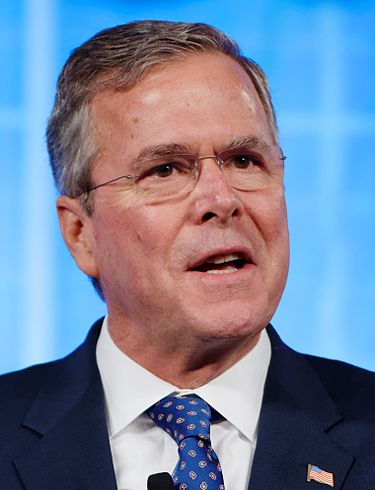"And what rough beast, its hour come round at last,
Slouches towards Bethlehem to be born?"
--- WB Yeats, "The Second Coming"
Whatever else happens, Donald Trump has made history: With no experience in elected office or the armed forces, he has won a state primary. He was almost twenty percentage points ahead of his nearest competitor in New Hampshire. What if he keeps winning?
.jpg/330px-Donald_August_19_(cropped).jpg) |
| Donald Trump |
Of the other candidates, Christie and Fiorina have now dropped out; and Carson's campaign has all but vanished. (Oh yeah, and there's Jim Gilmore. Who's he, you ask? Exactly.) That leaves four major rivals to Trump:
- Texas Senator Ted Cruz
- Ohio Governor John Kasich
- Former Florida Governor Jeb Bush
- Florida Senator Marco Rubio
 |
| Ted Cruz |
All three have significant flaws.
 |
| Marco Rubio |
 |
| Jeb Bush |
 |
| John Kasich |
Kasich is intelligent, experienced as a member of Congress and state governor, and appears less ideologically rigid than his counterparts. However he lacks money, campaign organisation and name recognition in the states which follow New Hampshire, and has little time to get them.
Even if two of the "mainstream" candidates dropped out and endorsed the third, it's unclear if it would do any good. After eight years of unconstrained rage against Obama, gleefully encouraged by the Republican establishment, the primary voters are in no mood for compromise. The very same establishment which recoils in horror from Trump and Cruz helped create them. Of all the candidates, those two are most adept at tapping into the fear, anger, and bigotry which have long been the Republican party's stock in trade.
With the primary electorate so divided, and the winner-take-all nature of Republican primary contests, it is more than possible for Trump or Cruz to emerge as the nominee. They can easily go on winning primaries with 30% or 35% of the vote.
If Trump is the nominee, my best guess is he will be crushed in the general election. The 20% or so of the voting public who support him now will continue to support him. Many of the rest will be horrified at the idea of President Trump, and turn out to vote for his opponent. Those who can't bring themselves to do that, out of visceral dislike for the Democrats, will stay home.
Over at Gin and Tacos, Ed makes a simple and very reasonable point: To take the White House, Trump would have to win multiple states which Romney failed to win from Obama. There is no indication he has even the beginnings of a strategy for doing so.
And yet, and yet. It would be foolish to make definite predictions, in this year of all years. What if Sanders is the Democratic nominee? I like Sanders, I think he has good ideas; but is America truly ready to elect a 74-year-old socialist as its next President? What if billionaire and former New York mayor Michael Bloomberg runs as an independent candidate, as he says he is considering, and splits the anti-Trump vote?
What if the Republican establishment reluctantly throws its weight behind Trump? Former Senator and 1996 Presidential nominee Bob Dole, the epitome of an elder statesman, has said Trump is preferable to Cruz. What if Republican governors, members of Congress, and rank-and-file supporters come out to campaign for Trump, because they prefer him to Clinton or Sanders?
Well, maybe. I still just don't see it. I suspect Clinton can win over enough moderates to defeat Trump heavily, perhaps by a landslide in the Electoral College. Sanders is more of an unknown quantity, but I still believe he has it in him to defeat Trump.
Similar considerations apply to Ted Cruz, only more so. The Republican leadership openly despise him, so he is unlikely to secure their backing. I think either Clinton or Sanders could comfortably stop him.
I really can't be sure, though. Nobody can. The only sure thing about this race is its unpredictability.
The smart prediction is that Trump might win the nomination, but won't win the election. It depends on the assumption that a comfortable majority of American voters simply don't want such a buffoon as their President. The trouble is, I can't help but think of HL Mencken's observation:
No one in this world, so far as I know—and I have researched the records for years, and employed agents to help me—has ever lost money by underestimating the intelligence of the great masses of the plain people. Nor has anyone ever lost public office thereby.
I try to reassure myself with the smart and sensible predictions; but like a childhood monster under the bed, the fear of President Trump won't quite go away.
No comments:
Post a Comment